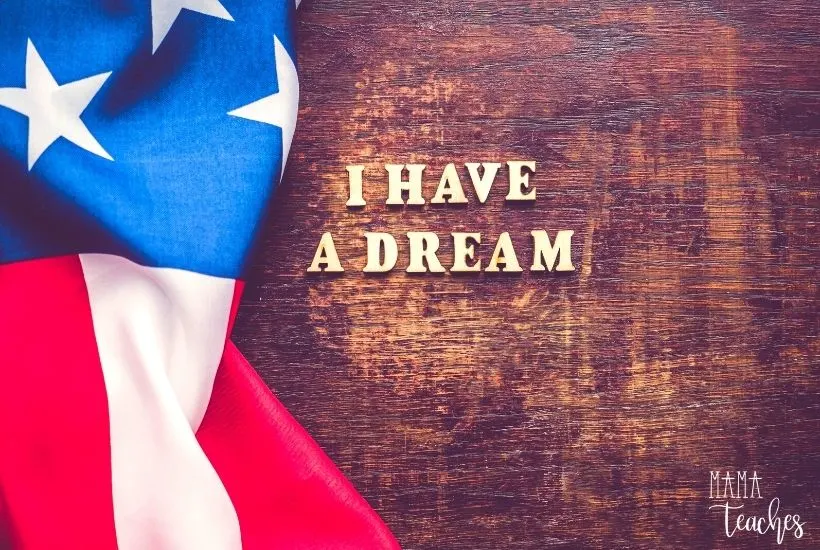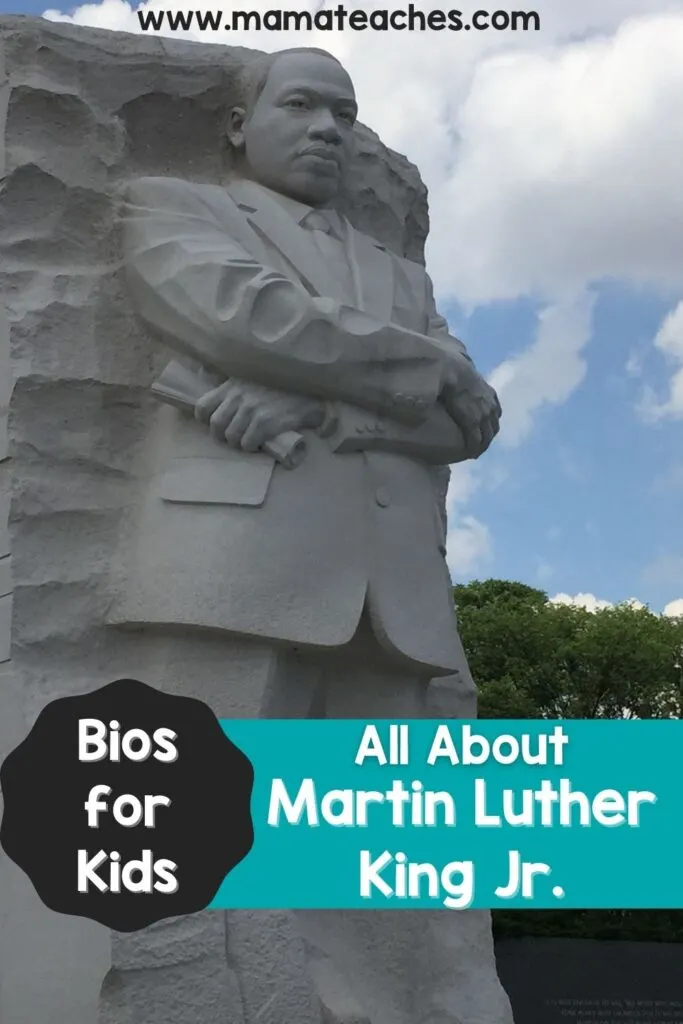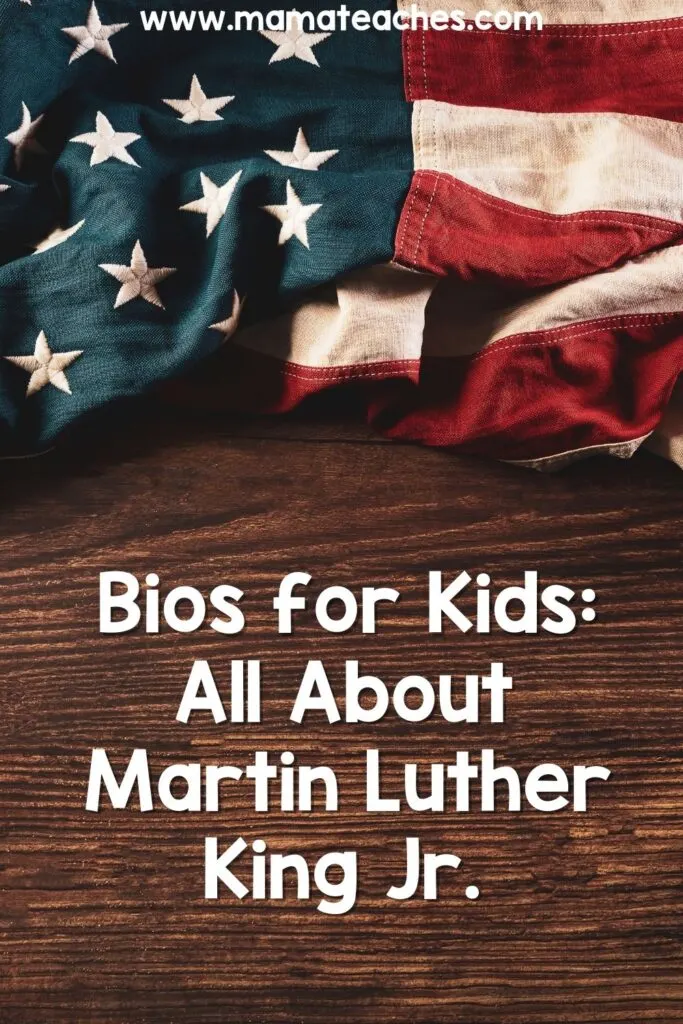MLK: These three letters stand for one of the most famous and influential leaders of the last century.
Read on to learn all about Martin Luther King Jr.
All About Martin Luther King Jr.
Dr. Martin Luther King Jr. (also known by his initials, MLK) was an inspiring leader of the U.S. civil rights movement.
He led many peaceful protests to bring about change; he wanted people of all races to be treated equally.
Because he was also a Baptist preacher, he was often called the Reverend Dr. Martin Luther King Jr.

This article contains affiliate links to things that you might like.
MLK’s Childhood
Dr. Martin Luther King Jr. was born in Atlanta, Georgia on January 15, 1929. He was originally named Michael, but when he was 5 his parents changed his name to Martin Luther in honor of a famous German man from church history.
From his youth, Dr. King was a bright student and powerful speaker.
He even skipped two grades in high school!
He competed in speech contests where he spoke about civil rights (Dr. King believed that every person should have the same rights and privileges as everyone else).
In the South, the civil rights of many of the people were being trampled.
At that time the Southern states were segregated; they had laws to keep people of color separate from white people.
There were separate schools, water fountains, bathrooms, and even hospitals!
These laws were unjust and unfair.

MLK’s Contributions
During the 1950s and 60s, Dr. King organized many marches and protests for the American civil rights movement.
He was an inspiring and influential leader, and his speeches stirred the hearts of millions of Americans.
If you want to know all about Martin Luther King Jr, you should know some of his contributions.
Montogomery Bus Boycott
In Montgomery, Alabama in 1955, a woman named Rosa Parks refused to give up her bus seat to a white man.
She was arrested and thrown in jail.
As a result, Dr. King organized a boycott of the bus system.
In this boycott, the people of Montgomery refused to ride the bus, and the bus company lost money.
381 days later, the city changed its laws so any person could sit anywhere on the bus!
The boycott was a success!
Southern Christian Leadership Conference
Dr. King knew that to change the unfair segregation laws in the South, people would need to be organized and united.
Dr. King and some other civil rights leaders formed the Southern Christian Leadership Conference in 1957.
They organized nonviolent protests and marches to get attention for their cause.
Voting Rights
In the South, it was nearly impossible for a person of color to vote.
Although a white person could walk right into a voting booth, a person of color would have to pass tests on reading and government to vote.
Dr. King fought for equal voting rights for every American.

Lunch Sit-Ins
Restaurants were another place where people were segregated, so Dr. King organized a sit-in of a restaurant inside an Atlanta department store.
He and 33 college students sat in the stools at the lunch counter and refused to move.
Though they were peacefully protesting, Dr. King was arrested and thrown in jail.
March on Washington
In August 1963, Dr. King was one of the featured speakers at the March on Washington.
Around 250,000 people gathered across the National Mall in DC.
It was a turning point in the civil rights movement, and Dr. King’s speech was unforgettable.
Inspiring Speeches
Dr. Martin Luther King Jr’s speeches called people to action and stirred the heart of a nation.
In his speech from the March on Washington (now called his “I Have a Dream” speech), he spoke these famous words:
“I have a dream that my four little children will one day live in a nation where they will not be judged by the color of their skin but by the content of their character…I have a dream that one day this nation will rise up and live out the true meaning of its creed — we hold these truths to be self-evident: that all men are created equal.”
King, Martin Luther. “I Have a Dream by Martin Luther King, Jr; August 28, 1963.” The Avalon Project, Yale Law School, 2008, avalon.law.yale.edu/20th_century/mlk01.asp. Transcript.
Facing Opposition
Being a civil rights leader was dangerous.
Dr. King was personally threatened countless times.
At marches and protests, Dr. King and the other protestors were attacked by police and arrested.
Though he faced daily opposition, Dr. King worked tirelessly for civil rights for all Americans.
Sadly, Dr. King was assassinated on April 4, 1968, when he was shot and killed on his motel balcony in Memphis, Tennessee.
The nation grieved his loss.

Honoring MLK
During his lifetime, Dr. Martin Luther King Jr. received many of the world’s greatest honors.
He received the Nobel Peace Prize in 1964; at the time he was the youngest person ever to receive the award.
Many civil rights organizations honored him.
He was awarded the Spingarn Medal from the NAACP and the John F. Kennedy Award from the Catholic Interracial Council of Chicago.
Time magazine named him “Man of the Year” in 1963. He received honorary degrees from colleges such as Boston University, Yale University, and Jewish Theological Seminary.
Professional organizations such as the Police Department of New York and the National Federation of Teachers honored Dr. King.
Over 1000 roads are named after him.
Today we honor Martin Luther King Jr. with a national holiday around the time of his birthday (the holiday is always the third Monday in January).
On MLK Day we remember him by helping others.
All About MLK
Now that you know all about Martin Luther King Jr., what are you going to do?
Are you inspired to lend a helping hand?
Dr. King dedicated his life to serving others and championing civil rights for all people.
There is no better way to remember him than by helping others.
You May Also Like:
- 5 Books About Eleanor Roosevelt for Kids
- Unit Study: Homeschool and Classroom How To Ideas
- Using Multi-Cultural Books to Teach History and Social Studies
Works Cited
Eiu. Martin Luther King Jr. Contributions, https://castle.eiu.edu/~wow/classes/fa03/mlkcontributions.html#:~:text=1%20Martin%20Luther%20King%20Jr.%20…%202%20He,Martin%20Luther%20King%20Jr.%20…%20More%20items…%20.
Lewis, David L. and Carson, Clayborne. “Martin Luther King, Jr.”. Encyclopedia Britannica, 2 Sep. 2021, https://www.britannica.com/biography/Martin-Luther-King-Jr. Accessed 2 November 2021.
“Martin Luther King, Jr..” Ducksters, https://www.ducksters.com/biography/martin_luther_king_jr.php.
“Southern Christian Leadership Conference (SCLC).” National Parks Service, U.S. Department of the Interior, https://www.nps.gov/subjects/civilrights/sclc.htm.
